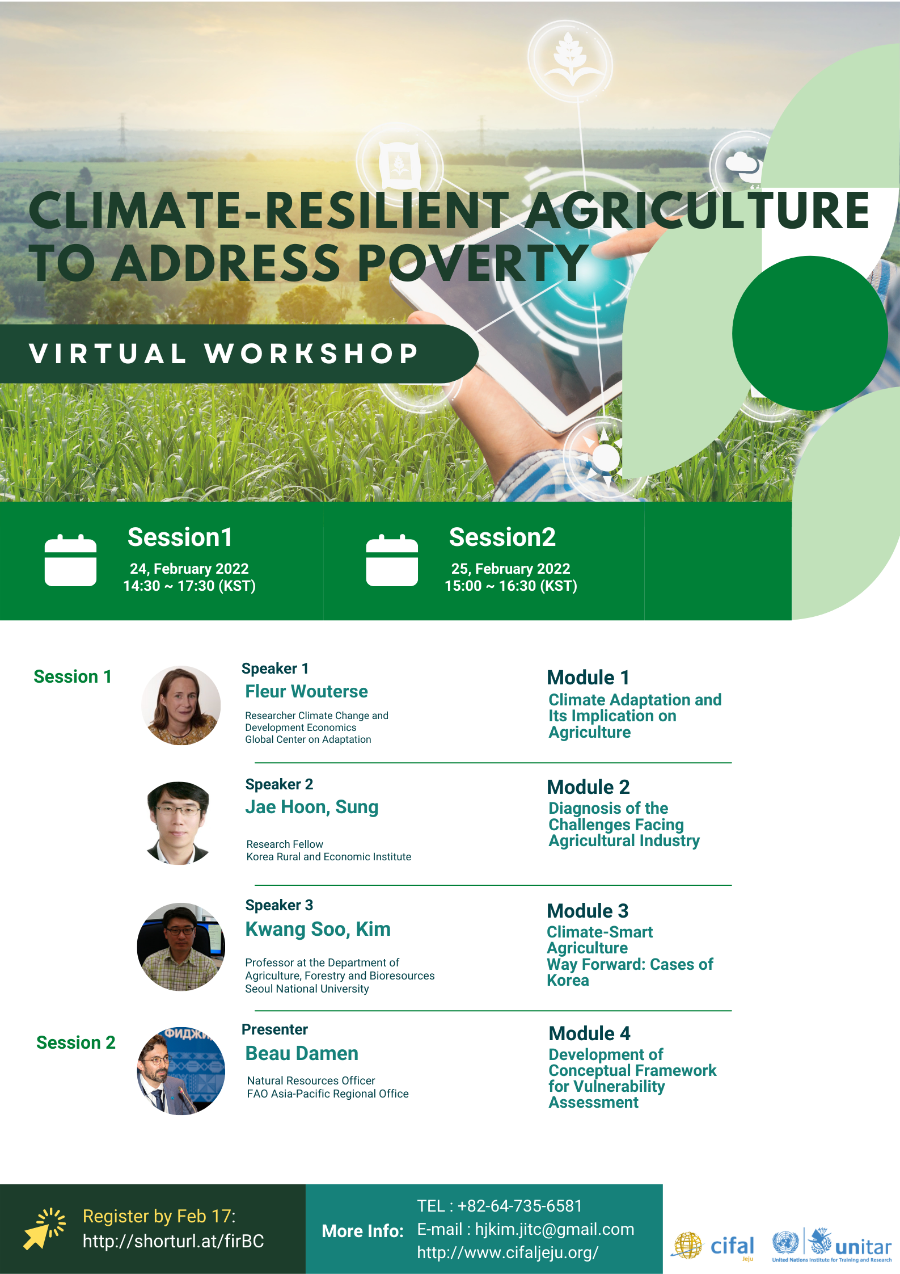
 2022.02.03
2022.02.03
|
|
||||||||||||||||||||||||||||||||||||
|
Week |
Time |
Details |
|
Session 1
February 24 (Thurs) 14:30 ~ 17:30 KST
3 hours |
14:30 – 14:45 (15 mins) |
Opening Introduction of the Programme |
|
14:45 – 15:15 (30 mins) |
Lecture (1) Fleur Wouterse, Global Center on Adaptation Climate Adaptation and Its Implication on Agriculture |
|
|
15:15 -15:45 (30 mins) |
Lecture (2) Jae Hoon Sung, Korea Rural Economic Institute Diagnosis of the Challenges Facing Agricultural Industry |
|
|
15:45 -16:00 (15 mins) |
Questions & Answers
|
|
|
16:00 – 16:10 (10 mins) |
Locally-led Adaptation Cases – Video |
|
|
16:10 – 16:20 (10 mins) |
Break |
|
|
16:20 – 16:50 (30 mins) |
Lecture (3) Kwang Soo Kim, Seoul National University Climate Smart Agriculture -Way Forward: Cases of Korea |
|
|
16:50 – 17:20 (30 mins) |
Panel Discussion - All three presenters engage in discussion |
|
|
17:20 – 17:30 (10 mins) |
Comment & Feedback Closing |
|
|
Session 2
February 25 (Fri) 15:00~16:30 KST
90 mins |
15:00 KST (5 mins) |
Opening |
|
15:00 – 15:20 (20 mins) |
Presentation, Beau Damen, FAO AP Development of Conceptual Framework for Vulnerability Assessment |
|
|
15:20 – 15:50 (30 mins) |
Group Exercise |
|
|
15:50 – 16: 20 (30 mins) |
Comment & Feedback – Colloquium
|
|
|
16:20 – 16:30 (10 mins) |
Wrap-Up |
|
|
Zoom link to be shared for the participants |
||
*The above program is subject to change
Event Objectives
For the capacity building, this event will:
-
Offer a venue for knowledge sharing and motivate participants to discuss climate adaptation, with a focus on agriculture and poverty;
-
Promote best practices including those of Jeju and Korea;
-
Encourage learning and applying a new policy tool that assists governments to improve their practices.
Learning Objectives
After the event, participants will be able to:
-
Raise awareness on the Climate-Smart-Agriculture (CSA) practices;
-
Understand the linkage between policy actions for climate adaptation in agriculture to reduce emissions, enhance resilience and increase productivity;
-
Practice vulnerability assessment tool to be able to apply at work.
Target Audience
-
Government officials and personnel from non-profit, civil, and private sectors in Asia and
the Pacific region who work on or are interested in climate adaptation and/or agriculture -
Government officials who are currently living and studying in Korea as exchange students
who can prove their interest and linkage on their work with the workshop topic
Requirements
Selected applicants are required to complete the followings to be eligible for a Certificate of Completion:
-
Attend and actively participate in all sessions
-
Complete individual assignment
Application and deadline
Application: https://forms.gle/F1B1GtDK7EbALr8T6
※ Late application will NOT be accepted.
※ Only selected applicants will be notified individually.
Deadline: February 17 2022 (Thursday)
[i] COP26 urged to prioritise adaptation as climate emergency surges (2021), Aljazeera(accessed via https://www.aljazeera.com/news/2021/9/6/cop26-summit-urged-to-prioritise-adaptation-as-emergency-surges
[ii] Climate change will alter where many crops are grown (2021), The Economist (accessed via https://www.economist.com/international/2021/08/28/climate-change-will-alter-where-many-crops-are-grown)
[iii] 농업분야의 기후변화 영향 페이, 국가기후변화 적응정보포털에서 발췌 (https://kaccc.kei.re.kr/portal/climateChange/changeeffect/changeeffect_view.do?num=3)[iv] Ibid.
[v]To fight poverty, we need more climate action (2021), Aljazeera (accessed via https://www.aljazeera.com/opinions/2021/11/6/to-fight-poverty-we-need-more-climate-action)
[vi] Realigning Agricultural Support to Promote Climate-Smart Agriculture (2018), World Bank






